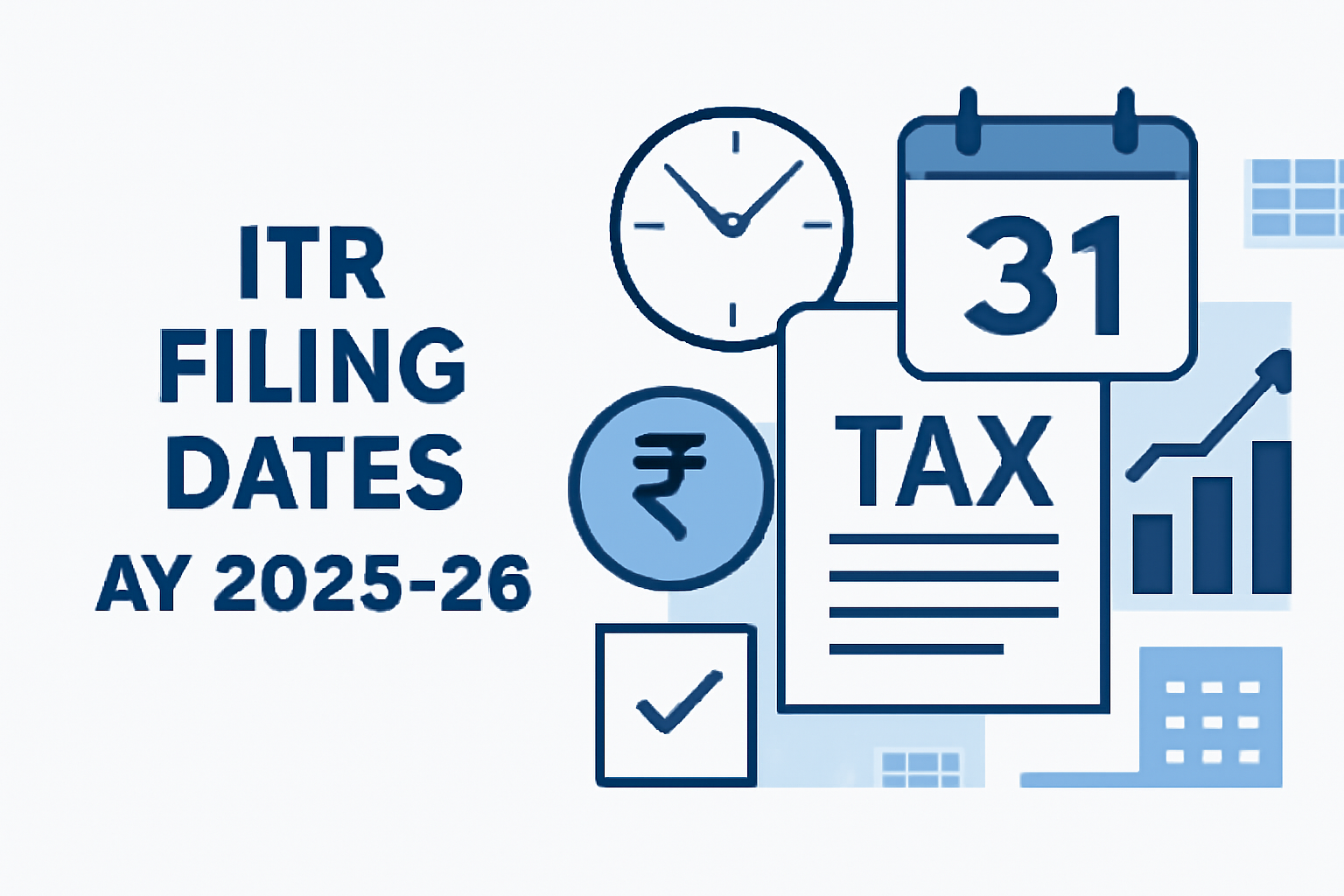
The due date to file Income Tax Returns for AY 2025–26 in non‑audit cases has been officially extended to 15 September 2025 by CBDT, while audited cases are due on 31 October 2025 and transfer‑pricing cases on 30 November 2025, with belated/revised returns allowed up to 31 December 2025 and specific late fees and interest for delays applying under Sections 234F and 234A respectively. For AY 2025–26 (corresponding to FY 2024–25), the tax audit report is due by 30 September 2025, the Form 3CEB transfer‑pricing report by 31 October 2025, and updated returns can be filed up to four years from the end of the assessment year under the expanded ITR‑U window introduced in 2025.
What changed this year
CBDT extended the standard non‑audit ITR due date from 31 July 2025 to 15 September 2025 via Circular No. 06/2025, citing administrative grounds; this relief applies to taxpayers covered under clause (c) of Explanation 2 to Section 139(1), i.e., those not requiring audit. The Income Tax Department’s official tax calendar and a separate press communication reflect the revised timeline, confirming the extended non‑audit deadline and maintaining subsequent category‑wise dates. Leading tax guides and news outlets reiterated that while non‑audit taxpayers benefit from the extension, audit and transfer‑pricing timelines remain unchanged unless notified otherwise.
AY 2025–26 basics
AY 2025–26 corresponds to income earned in FY 2024–25, and the department’s help pages and third‑party guides consistently present due dates in that mapping for individuals and entities. The extension primarily covers individuals/HUFs/AOPs/BOIs not liable to get books audited, whereas companies, firms, LLPs, and transfer‑pricing cases follow separate audit‑linked schedules. Recent advisories emphasize finishing returns early to avoid last‑minute portal congestion and to ensure accurate reconciliation of TDS/AIS before filing.
Extended deadlines at a glance
- Non‑audit cases (Individual/HUF/AOP/BOI, no audit): ITR due on 15 September 2025 per CBDT Circular 06/2025 and the ITD calendar.
- Audit cases under Section 44AB: Tax audit report due 30 September 2025 and ITR due 31 October 2025, with no official extension announced as of early September 2025.
- Transfer‑pricing cases (Section 92E): Form 3CEB report due 31 October 2025 and ITR due 30 November 2025 as per standard practice reiterated this year.
- Belated and revised returns: Permitted until 31 December 2025 for AY 2025–26 under Sections 139(4)/(5).
- Updated return (ITR‑U): Window expanded to 48 months from end of AY beginning 1 April 2025; for AY 2025–26 this runs up to 31 March 2030.
Official confirmation of the extension
CBDT Circular No. 06/2025 dated 27 May 2025 explicitly extends the Section 139(1) due date for the specified non‑audit class from 31 July 2025 to 15 September 2025. The department’s tax calendar and press release mirror the same substance, providing a unified calendar view that downstream media and tax‑tech platforms have echoed for public guidance. Multiple mainstream explainers also note there has been no subsequent extension signal beyond mid‑September for non‑audit cases as of the first week of September 2025.
Category‑wise due dates and compliance
- Individuals/HUFs/AOPs/BOIs (non‑audit): ITR filing due 15 September 2025; belated/revised up to 31 December 2025 if the main deadline is missed.
- Audit cases (Section 44AB): Upload and get acceptance of the tax audit report by 30 September 2025, then file ITR by 31 October 2025 as sequenced by the portal’s workflow this year.
- Transfer pricing (Section 92E): Furnish Form 3CEB by 31 October 2025 and file ITR by 30 November 2025; this sequencing is reflected in multiple compliance calendars.
- Entities help pages: Company/LLP guidance on the portal reiterates audit‑linked staging of reports one month prior to the ITR due date in the compliance flow.
Belated, revised, and updated returns
If the 15 September due date is missed in non‑audit cases, a belated return under Section 139(4) can still be filed up to 31 December 2025, with late fees and interest applying, and certain carry‑forward benefits restricted. A revised return under Section 139(5) may also be filed up to 31 December 2025, matching the belated timeline for corrections and updates within the same assessment year. Beyond that, the updated return regime (ITR‑U) under Section 139(8A) now permits a 48‑month window from the end of the assessment year, enabling regularization up to 31 March 2030 for AY 2025–26, albeit with additional tax percentages that increase with delay.
Penalties and interest for delays
- Late filing fee (Section 234F): ₹5,000 if total income exceeds ₹5 lakh; restricted to ₹1,000 if total income is up to ₹5 lakh; no fee if income is below the basic exemption limit.
- Interest for delay (Section 234A): Simple interest at 1% per month or part month on unpaid tax from the day after the due date until actual filing, as per official tutorial guidance.
- Advance tax shortfall/deferment (Sections 234B/234C): Statutory interest applies for insufficient or delayed advance tax payments as clarified in the department’s FAQs.
- Audit non‑compliance: Missing the Section 44AB audit can attract penalty exposure (e.g., up to 0.5% of turnover/receipts) and also disrupt the ITR filing sequence for audited cases.
Practical filing guidance
Tax professionals urge avoiding last‑minute filings given portal slowdowns near deadlines, and to validate TDS/AIS/26AS credits before pressing submit to minimize mismatches. Because TDS statements finalized by 31 May often reflect in June, the extended September window gives additional time to reconcile, which many advisories cite as a practical benefit of this year’s extension. For audited entities, ensure the audit report is uploaded and accepted well ahead of 31 October, since ITR filing is contingent on that acceptance in the e‑filing flow.
Who is covered by audit and transfer pricing
Section 44AB audit typically applies based on turnover/gross receipts thresholds and professional income limits, and multiple compliance explainers highlight the broad contours for businesses and professionals each year. Where international or specified domestic transactions exist, Section 92E reporting via Form 3CEB is mandatory and precedes the 30 November ITR timeline by one month in standard practice. Entities pages on the portal emphasize report staging a month prior to ITR due dates within the workflow for relevant categories.
Consequences of missing deadlines
Missing the 15 September deadline for non‑audit cases shifts the return to belated status, triggering Section 234F late fees and Section 234A monthly interest on tax due, while constraining carry‑forward of certain losses such as business and capital losses. Late filing also elevates scrutiny risk and can delay refunds due to additional checks, as noted by tax advisories discussing the operational realities of delayed compliance. Media guidance indicates no expectation of further blanket extensions; therefore, planning for the stated dates is prudent.
Key dates: AY 2025–26
- 15 September 2025: Non‑audit ITR due (extended).
- 30 September 2025: Tax audit report due (Form 3CD with 3CA/3CB).
- 31 October 2025: Audited ITR due; 92E accountant’s report (Form 3CEB) due.
- 30 November 2025: ITR due for cases covered by Section 92E.
- 31 December 2025: Last date for belated and revised returns.
- 31 March 2030: Outer limit for ITR‑U for AY 2025–26 under 48‑month rule.
Common scenarios and how to respond
- Non‑audit salaried taxpayer filing on 16 September: The return becomes belated and attracts late fee (₹5,000 if income > ₹5 lakh, otherwise ₹1,000) plus 1% simple interest per month on unpaid tax; file by 31 December 2025 to remain compliant.
- Firm getting audited, report filed on 2 October: Expect potential exposure for late audit as per Section 44AB compliance norms and proceed to file ITR by 31 October, documenting reasons where applicable.
- Transfer‑pricing case completing Form 3CEB on 31 October: File ITR by 30 November 2025 in line with Section 92E timelines.
Best practices before filing
- Reconcile AIS, Form 26AS, and TDS/TCS entries to avoid mismatches, a step tax experts and media emphasize as deadlines approach.
- Ensure all third‑party statements that influence pre‑filled data are finalized and visible on the portal, acknowledging mid‑year TDS reflection timelines.
- For audited and transfer‑pricing cases, schedule statutory reports ahead of ITR to prevent sequencing bottlenecks.
FAQs
Q1. What is the extended ITR due date for AY 2025–26 in non‑audit cases?
The extended due date is 15 September 2025 per CBDT Circular No. 06/2025 and the ITD calendar.
Q2. Does the 15 September extension apply to audited taxpayers?
No; audit cases remain due on 31 October 2025 for ITR filing, with the tax audit report due on 30 September 2025 unless any separate extension is later notified.
Q3. What are the due dates for transfer‑pricing cases?
File Form 3CEB by 31 October 2025 and the ITR by 30 November 2025 for AY 2025–26.
Q4. Can returns be filed after 15 September 2025 in non‑audit cases?
Yes; a belated return under Section 139(4) can be filed up to 31 December 2025, with late fee and interest consequences.
Q5. What is the late filing fee under Section 234F?
₹5,000 if total income exceeds ₹5 lakh, ₹1,000 if total income is up to ₹5 lakh, and none if income is below the basic exemption threshold.
Q6. What interest applies for late filing under Section 234A?
Simple interest at 1% per month or part month on the outstanding tax from the day after the due date until the date of actual filing.
Q7. What happens to carry‑forward of losses if a return is belated?
Belated returns can restrict the carrying forward of certain losses such as business and capital losses, so timely filing is advisable.
Q8. Until when can a revised return be filed?
A revised return under Section 139(5) may be filed until 31 December 2025 for AY 2025–26.
Q9. How long is the updated return (ITR‑U) window now?
From 1 April 2025, the ITR‑U window is 48 months from the end of the assessment year; for AY 2025–26, the outside date is 31 March 2030, with additional tax percentages depending on how late it is filed.
Q10. Is another extension beyond 15 September likely?
As of early September, media and advisories indicate no signal of another extension; plan filings within the announced timelines.
Q11. What are the interest provisions for advance tax shortfall?
Interest under Sections 234B and 234C applies to shortfall in payment or deferment of advance tax, as clarified in the department’s FAQs.
Q12. What if an audit report is not uploaded before the audited ITR due date?
ITR filing for audited cases requires the audit report to be uploaded and accepted first; missing the audit timeline risks penalties and blocks timely ITR submission.
Q13. What are the main reasons CBDT cited or considered for extending the non‑audit due date?
Operational readiness and system timelines around revamped ITR utilities and TDS credit reflection were discussed widely across official calendars and advisories around the extension.
Q14. Does the extension change the transfer‑pricing ITR due date?
No; transfer‑pricing ITRs remain due on 30 November 2025, with Form 3CEB due on 31 October 2025.
Q15. What should be done now to avoid last‑minute problems?
Reconcile AIS/26AS/TDS, collect proofs and statements, and file ahead of the deadline to avoid portal congestion and errors.
Compliance checklist
- Confirm category: Non‑audit vs audit vs transfer‑pricing and map to the correct due date.
- Reconcile information: Match AIS, 26AS, and TDS/TCS and fix mismatches before filing.
- Stage reports: Upload tax audit report (if applicable) by 30 September and Form 3CEB (if applicable) by 31 October prior to ITR.
- File and track: File ITR by the applicable due date and monitor acknowledgment and any processing updates under Section 143(1).
Final takeaway
The flagship change for AY 2025–26 is the extended non‑audit ITR deadline of 15 September 2025, while audit and transfer‑pricing schedules remain anchored to 30 September, 31 October, and 30 November milestones, with belated/revised returns up to 31 December and an expanded ITR‑U window to keep compliance paths open for longer albeit at higher costs. Filing early, reconciling data, and completing prerequisite reports in order will reduce penalties, interest, and administrative friction under Sections 234F, 234A, and related compliance rules.

